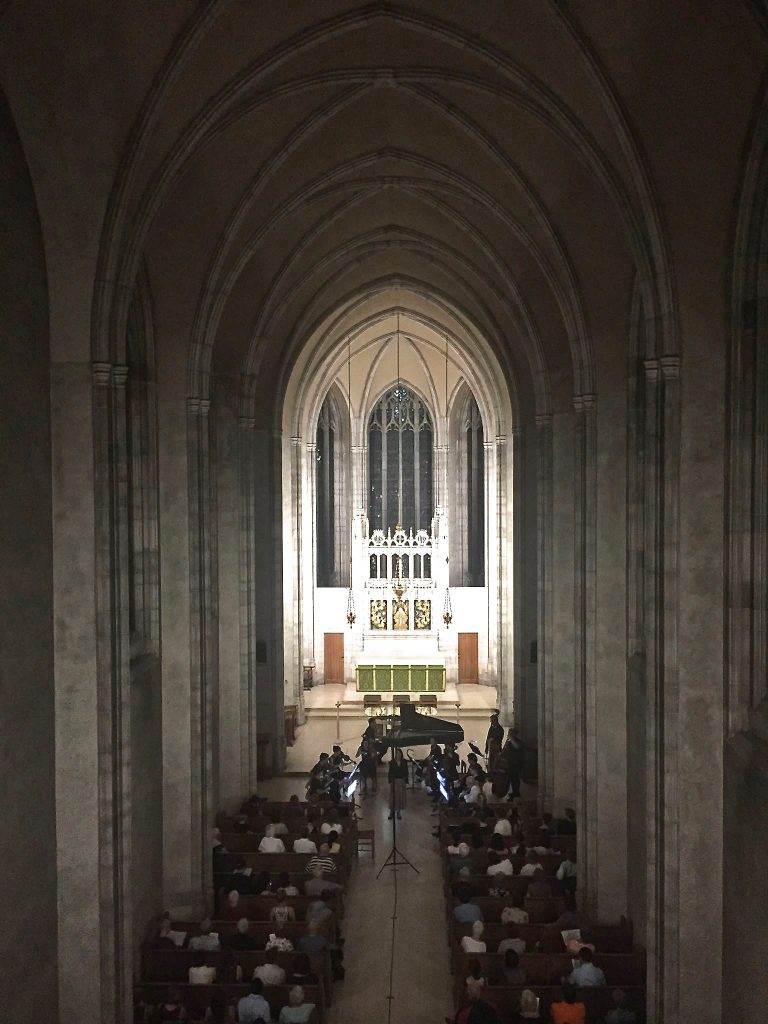Singers:
- Jennifer Routhier, mezzo-soprano
- Anna Sharpe, mezzo-soprano
- Anais Kelsey-Verdecchia, soprano
- Benjamin Shaw, countertenor
- Eliza Jane Cassey, soprano
- Korin Thomas-Smith, baritone
- Ryan McDonald, countertenor
- Camille Rogers, mezzo-soprano
- Rachel Allen, soprano
- Madelaine Worndl, soprano
- Georgia Burashko, mezzo-soprano
- Alexandra Hetherington, mezzo-soprano
- Lauren Estey, soprano
- Madison Angus, soprano
Orchestra:
- Jeanne Lamon, violin
- Andrew Dicker, violin
- Kailey Richards, violin
- Rezan Onen-Lapointe, violin
- Matthew Antal, viola
- Margaret Jordan-Gay, cello
- Joel Tangierd, cello
- Matthew Girolami, double bass
- Arianna Verbee, double bass
- John Abberger, oboe
- Ruth Denton, oboe
- Christopher Bagan, harpsichord
On an unseasonably hot September night, in an exquisite Gothic Revival chapel, an irrepressible 18th century composer sent the collective enthusiasm of early music students soaring last Sunday, singers and instrumentalists spirited partners in a courageous concert of daring proportions.
Highlighting excerpts from George Frideric Handel’s dazzling 1724 operatic masterpiece, Giulio Cesare, the University of Toronto Faculty of Music’s Fall Baroque Academy provided ample occasions for emerging artists to shine. Although not always pressed to fullest conclusion by performers still understandably exploring the far-reaching parameters of expression and technique, opportunities for wholehearted engagement were vibrantly exploited. Trinity College Chapel rang with passion.
Encompassing an intense 5-day program of vocal coaching led by sopranos Nancy Argenta and Victoria’s Ingrid Attrot, joined by mezzo-soprano Krisztina Szabó, this, U of T’s third annual Academy unfolded on a delightfully uplifting succession of lofty high notes. A featured lecture by Handel specialist Professor Mary Ann Parker complimented by intense drama counselling, a series of focused ½ hour aria-specific master classes with Opera Atelier Stage Director Marshall Pynkoski, gave expanded resonance to a uniquely perceptive presentation.
Supported by an unfailingly buoyant 12-player student ensemble, augmented by a handful of imported professionals, sensitively conducted from the ranks by guest Music Director Jeanne Lamon, the 14 members of founder Daniel Taylor’s remarkable Schola Cantorum took command of 11 distinct arias. Primarily featured as soloists, occasionally in duets, singers provided context, each précising moments of salient libretto, Giulio Cesare play by play.
Summoning a grand upsweep of harmony and stately rhythm, Lamon and associates opened with Cesare’s Overture, playing with a clarity and crispness that was to characterize virtually all that was to follow.
Centering the proceedings with a particularly poignant rendering of Handel’s inexpressibly sorrowful duet, Son nata a lagrimar (“I was born to weep”) mezzo-soprano Camille Rogers and countertenor Ryan McDonald movingly encapsulated the suffering of a loving mother and son cruelly forced to part, their voices intertwining, pure, caring, gently physical.
Anchoring an earlier vignette, emotionally opposed but equally pointed, soprano Anais Kelsey-Verdecchia contributed a deliciously snappy Non disperar (“Do not despair”), Cleopatra’s stinging reprimand to brother Ptolemy for offending noble Caesar with the impetuous young Egyptian’s violent ways. Slapping and pulling hair, counter-tenor Benjamin Shaw seated arms crossed, fuming in mute defiance, Kelsey-Verdecchia ranted and raged with exquisite fury, a sibling spat rendered simultaneously epic and intimate. Shaw’s handling of Sesto’s red hot vengeance aria, L’empio, sleale, indgno (“This perfidious, unworthy miscreant”) that followed sizzled with pent up rage.
Giulio Cesare is an explosive piece, arguably the most entertaining of all Handel’s Italian operas, a work crackling with almost unlimited potential for spectacular vocal pyrotechnics. It takes an audacious singer to light the fuse. Every principal must essentially make the music their own while being acutely mindful that at the core of George Frideric’s rigorous ABA da capo arias, embedded in all the formula and gilding, lies a wealth of profound timeless humanity.
Slipping into a trouser role as Sesto, mezzo-soprano Georgia Burashko dispatched Handel’s darkly psychological anthem to self-hate, L’angue offeso mai riposa (“The angered snake never rests”) with great confidence, mirroring Sesto’s anguished feelings of impotence, a hero unable to avenge his father’s vicious murder. Burashko’s coloratura was a model of expressiveness, emotionally evocative, confidant and direct.
An instant favourite whenever sung, Cleopatra’s exquisitely lyrical anthem to love and longing, V’adoro pupille (“I adore you, dear eyes”) was delivered with great tenderness tinged with seductive power by Rachel Allen, Caesar’s enchantment reflected in gentle parlando warmly voiced by fellow soprano Madelaine Worndl.
A rousing chorus of Egyptians concluded the evening, tutti cantanti.
Asked about his perception of his role as Head of Historical Performance in a brief one-on-one post concert conversation, a smiling Maestro Taylor said simply, “not to educate the feeling and creativity away.” Judging from the boundless energy and tireless commitment of his students, he and his Academy colleagues must surely be overjoyed by the scope of their success. The capacity audience in attendance at Trinity College most certainly was.
* * *
Photo courtesy Theatre of Early Music


